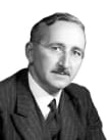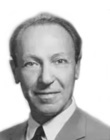Ludwig von Mises (1881 - 1973)

Das Wesen der Staatstätigkeit ist, Menschen durch Gewaltanwendung oder Gewaltandrohung zu zwingen, sich anders zu verhalten, als sie sich aus freiem Antriebe verhalten würden
Ludwig von Mises was among the most important economists of the 20. Century and the leader of the 3. Generation of the Austrian School of Economics. Best known for his major book, Socialism (1922), which to date still is the sharpest refutation of socialism. And in his magnum opus, Human Action (1949) in which he presents a comprehensive case for free markets and the methodology of understanding human action. L.v. Mises was never offered a regular professorship thus his main teaching took place mostly in his private seminars, first in Vienna and later in New York. A prolific writer, his vast oeuvre ranges from monetary- and business cycle theory and his seminal demonstrations of the impossibility of socialist calculation to his profound insights into the methodology of the social sciences. His works in liberal (European sense) philosophy corresponds profoundly with economic theory. Mises superior expertise was generally acknowledged, but his advice was rarely taken, let alone followed. He died in 1973 in New York. Guido Hülsmann’s ‘Mises: The Last Knight of Liberalism’ (2007) is the most authoritative biography. The best collection of his important but lesser known texts is ‘Der unbekannte Mises’ (2003), ed. K.R. Leube.
Although several authors before him worked on the impossibility of economic calculation under socialism, their work remained largely without influence on theory and politics. Thus, we owe the clear proof of the necessary failure of every socialist system essentially to Ludwig v. Mises. His book Socialism: An Economic and Sociological Analysis (1922) contains perhaps the most complete arsenal of arguments ever advanced against socialism and sparked the heated international “Socialism Debate” of the 1930s. However, it was not the leading socialist theorists such as O. Lange, F.M. Taylor or H.D. Dickinson who proved superior in these major long lasting discussions. It was Ludwig von Mises and his ‘pupil’ Friedrich A. von Hayek who thoroughly shattered the theoretical basis of all forms or shapes of socialism. Although the collapse of the Soviet Union signaled the tragic end of this ideology, the movements of ‘Woke’ or ‘Cancel Culture’ in some western countries promote socialism again as trendy fads in new masquerades.
Ludwig von Mises was born on September 29, 1881 in Lemberg (Lviv, Ukraine) in one of the most eastern corners of the Habsburg monarchy. His family moved to Vienna and in accordance with his social class, he attended the Academic Gymnasium in Vienna and completed his law studies at the University of Vienna in 1906. Under the influence of Carl Menger (the founder of the Austrian School of Economics), Friedrich von Wieser and especially Eugen von Böhm-Bawerk, Mises soon became the leading figure of the 3rd generation of the Austrian School.
Because he already suspected the hopelessness of ever obtaining a regular professorship in one of the universities within the KuK monarchy Mises decided to join the Vienna Chamber of Commerce in 1909. His extensive expertise allowed him to rapidly rise in the ranks there and thus was primarily entrusted with the difficult financial and currency policy problems of the pre-, post- and interwar periods. As a leading expert, Mises also took part in the grueling peace negotiations in Saint Germain.
Mises conducted his famous Private Seminar in his office in the Vienna Chamber of Commerce until 1934. With F.A. von Hayek, G. von Haberler, H.J. von Fuerth, Steffy Brown, O. Morgenstern or F. Machlup among several others this seminar became the nucleus of this 4th generation of the Austrian School of Economics. Due to the Mises Seminar the Austrian school continued to dominate internationally with pioneering works.
His book, Theory of Money and Credit published in Vienna in 1912 proved to be a seminal breakthrough in monetary theory and became an inspiration for further research. Based on Carl Menger’s insights Mises explained the origin and value of money with the help of the Austrian subjective marginal utility theory, emphasizing the crucial influence of a certain Vorsichts-Kassenhaltung. For Mises the demand for money is not determined by the amount of money in circulation, rather it is determined by the market participants, who always subjectively assess the respective market situation. With this theory, Mises criticized the ‘neutrality of money’ on grounds that the amount of money and the purchasing power of money are not inversely proportional. Every increase in the amount of money necessarily leads to changes in the economy, in which a politically induced reduction in credit costs has to push the interest rates on loans below the ‘natural rate of interest’ (Wicksell) of capital. This leads to misallocations of capital and to shifts in the production structure, which however, will only become clearly recognizable when interest rates on loans gradually return to the level of the ‘natural rate of interest’ on capital due to the artificially stimulated demand for consumer goods. Thus, the next economic downturn is already programmed. With these basic ideas, Mises presented the ‘Austrian’ business cycle theory, which then found its most mature form with Hayek and to date is still valid.
During WWI, Mises served as artillery officer on the Eastern Front and later in Vienna. Immediately after the unfortunate collapse of the Habsburg Empire, his almost prophetic book Nation, Staat und Wirtschaft appeared in 1919. Regretfully it did not find the readership due to the chaos of the post-war period. A second edition was published in 2006 by ECAEF (Vaduz).
The slowly emerging anti-Semitism in Austria during the interwar period drove many young social scientists out of the universities and later, as a last resort, into exile. The insolvency of the traditional Credit-Anstalt in Vienna not only triggered a devastating panic, but also initiated clashes between rival radical groups, which ultimately ended in Austria’s bloody civil war. At this time of growing concern, Mises surprisingly was appointed to the Institute Universitaire des Hautes Etudes in Geneva in 1934, where he probably spent his happiest time until 1940. With Hayek in London, Mises and Haberler in Geneva, Machlup, Morgenstern and Voegelin in the USA, and countless others scattered around the world, Vienna thus ceased to be a center of advanced social science research. This devastating ‘brain drain’ subsequently turned into a ‘brain gain’ for the US, England and also for Switzerland.
As mentioned above, in his famous 1922 book Socialism he succeeded in systematically proving the impossibility of socialist economic calculation. Between 1927 and 1933 in rapid succession Mises published his Liberalism (1927), Monetary Stabilization and Business Cycle Policy (1928), Interventionism (1929) and his major methodological contribution, Die Grundprobleme der Nationaloekonomie (1933).
When the situation in Geneva became dangerous for Mises and his wife in the spring of 1940, he decided to emigrate to the USA and, despite endless bureaucratic hurdles and a daring flight through France and Spain, he arrived in New York at the age of almost 60, penniless and embittered. At the same time his magnum opus Nationalökonomie, was published in Geneva, but remained almost unread in the German original until the late 1970s. In 1949 however, this major book was translated as Human Action. A Treatise on Economics for the American public. In the meantime, translated into 10 languages, this book contributed significantly to the dissemination of his ideas and to the revitalization of the Austrian School. In this dynamic theory of human action Mises defines economics as a study of achieving ends but not of choosing the right means. Individual evaluations and objectives are subjective and therefore cannot be scientifically determined. This approach leads consistently to the strict rejection of all state interventions in the economic process, because every isolated intervention logically requires further interventions and must therefore result in a situation that restricts not only economic freedom. It restricts also any individual freedom of action to such an extent that socialism almost is felt as an act of liberation. Despite his desperate situation he succeeded in publishing his Bureaucracy and Omnipotent Government in 1944. In his Rise of the Total State and the Total War he rejected the still widespread Marxist view that National Socialism was a capitalistic ideology.
Although a regular appointment would have honored any American university, only New York University was willing to allow Mises at least one modest guest lecture per month in 1945 and later made him a ‘visiting professor’ until the age of 1968. Like in Vienna during the late 1920s and early 1930s, Mises successfully organized another Private Seminar at NYU. Again, he was able to make this seminar the nucleus of the American core of the 5th and 6th generation of the Austrian School of Economics. Thus Ludwig von Mises was actually the only scholar who had a school-forming effect among the ‘Austrians’ of the 20th century. In 1957 his last major book, Theory and History. This interpretation of social and economic evolution was published in New York and provided the philosophical background for his magnum opus Human Action.
Mises’ clear manner, which sometimes bordered on harshness, and his sharp formulations did not always make it easy for his colleagues, friends and readers to follow him. His sometimes polemical style is perhaps best understood from the bitterness accumulated during his unusual long academic career. His great work arose from the synopsis of interdependent disciplines and therefore occupies a leading place in the humanities as a whole. He died in New York on October 10, 1973. Only 29 people have turned up for the funeral of one of the greatest thinkers of the 20th Century.
Kurt R. Leube





































